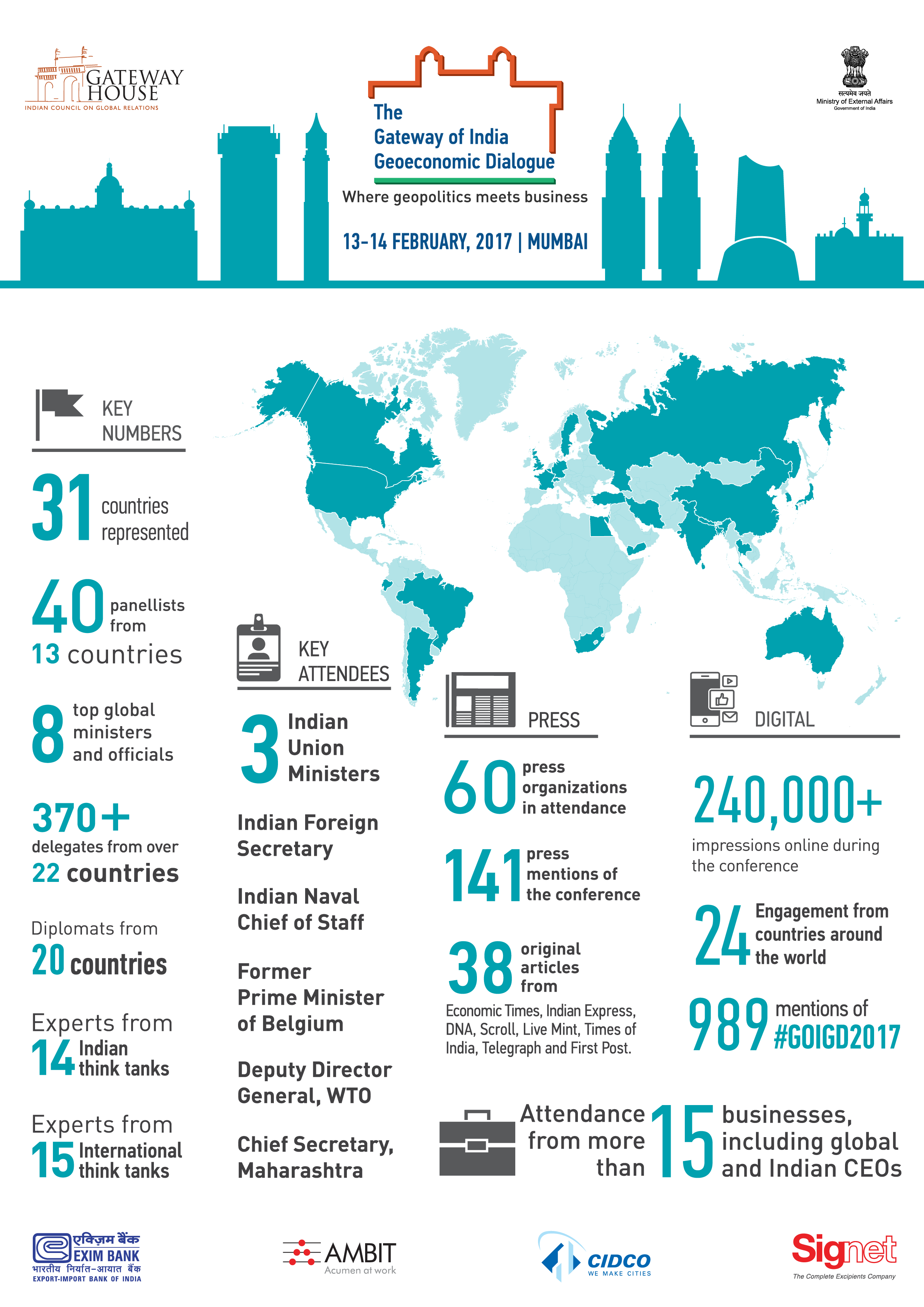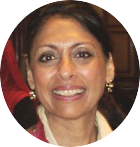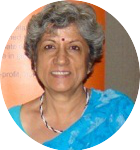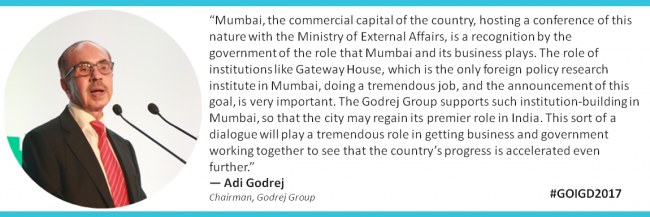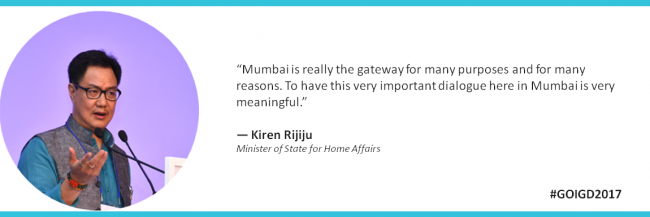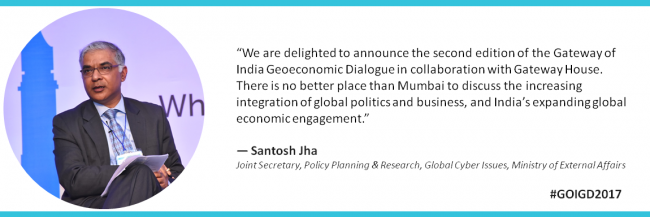Gateway House: Indian Council on Global Relations and the Ministry of External Affairs, Government of India, co-hosted the second Gateway of India Geoeconomic Dialogue on 13-14 February 2017. It brought together 370 delegates from 22 countries and 40 expert panellists from 13 nations. The topics that they covered included: the future of globalisation, the use and abuse of capital flows, disruption in global business models due to digitisation and financialisation, challenges in creating a defence industrial base for India, and aligning developmental and diplomatic goals.
“We are delighted to announce the second edition of the Gateway of India Geoeconomic Dialogue supported by the Ministry of External Affairs. We look forward to welcoming great minds from global politics and business to Mumbai to debate the role of corporations in India’s expanding global engagement.”
Manjeet Kripalani & Neelam Deo, Directors and Co-Founders, Gateway House
13 February, 2017 | Monday
5.45pm – 6.15 pm | Cocktails
6.15pm – 6.20pm | Welcome Remarks
Swadheen Kshatriya, Chief Secretary, Government of Maharashtra
6.20pm – 7.20pm | Inaugural Dialogue
Hon’ble M.J. Akbar, Minister of State for External Affairs, Government of India
In conversation with Hon’ble Mohammed Shahriar Alam, State Minister, Ministry of Foreign Affairs, Government of Bangladesh
7.20pm – 7.50pm | Inaugural Keynote I
Topic: Europe at the Crossroads
His Excellency Yves Leterme, Former Prime Minister of Belgium; Secretary General, International IDEA, Stockholm
7.50pm – 8.20pm | Inaugural Keynote II
Topic: India in the Global Digital Economy
Hon’ble Ravi Shankar Prasad, Minister of Law & Justice and Minister of Electronics & Information Technology, Government of India
8.30pm | Dinner
14 February, 2017 | Tuesday
8.00am – 8.45am | Registration
9.00am – 10.00am | Opening Conversation
Topic: Political Changes, Economic Uncertainties
S. Jaishankar, Foreign Secretary, Ministry of External Affairs, Government of India, in conversation C. Raja Mohan, Director, Carnegie India, New Delhi
10.00am – 11.15am | Geoeconomic Dialogue I | Moderator: Rohinton P. Medhora, President, Centre for International Governance Innovation, Canada
Topic: A Reversal of Globalisation?
Globalisation is being blamed by the West for its economic slowdown and rising inequality, which it argues is at the cost of the poor in India and China being lifted out of poverty. This has caused deep political fissures and resentment of free trade and labour mobility. Is globalisation really at fault? What is the impact of the politics of anti-globalisation and isolation across the world including in former champions of free trade UK, U.S. and EU?
What does this mean for India, which is now integrating itself with the world economically as never before but facing a decline in exports, rising trade barriers and excess capacity? How can India prepare for the new era?
Yonov Frederick Agah, Deputy Director General, World Trade Organisation, Geneva
Dennis Snower, President, Kiel Institute for the World Economy, Germany
Dalip Pathak, Special Limited Partner, Warburg Pincus, London
Mukund Rajan, Head, International Operations, Tata Sons, Mumbai
Ashok Malik, Distinguished Fellow, Observer Research Foundation, New Delhi
11.15 am – 12.30pm | Geoeconomic Dialogue II | Moderator: Luis Miranda, Advisory Board Member, Gateway House; Senior Advisor, Morgan Stanley Infrastructure, Mumbai
Topic: Sovereign Funds & the Strategic Imperative
Sovereign wealth funds are regarded as desirable patient capital for countries. Now, with low oil prices and low interest rates, have their priorities changed? Have they been restructured to separate from their domestic politics to be more independent and generate returns? What are the best practices and lessons for India’s new sovereign wealth fund, which can complement the existing funds and help India balance the large investments that China is making in India’s strategic sphere?
Yaduvendra Mathur, Chairman & Managing Director, Export-Import Bank of India
Sujoy Bose, CEO, National Investment Infrastructure Fund, India
Rakesh Jhunjhunwala, Partner, Rare Enterprises, Mumbai
Zheng Bin, CEO, Industrial & Commercial Bank of China, Mumbai
Anastasia Likhacheva, Head of Economic Sanctions Research Programme, National Research University Higher School of Economics, Moscow
12.30 pm – 1.30 pm | Lunch
1.30 pm – 2.45 pm | Geoeconomic Dialogue III | Moderator: K.N. Vaidyanathan, Senior Geoeconomics Fellow, Gateway House; Chief Risk Officer, Mahindra & Mahindra, Mumbai
Topic: Global Taxation: Use, Abuse and Misuse of Capital Flows
Tax havens have long been the tool for channeling capital and for obscuring individual and corporate identities. In parallel, transfer pricing and treaty shopping are depriving governments of legitimate revenues. This is evident from the EU fine on Apple, the U.S. Dept of Justice fines on foreign banks, the revelations of the Panama Papers, the demonetisations across the world, the diluted impact of sanction embargoes and various amnesty schemes. International financial regulators have created an automatic global tax information-sharing network to counter tax evasion and avoidance. Can these be effective cross-border measures in an entrenched extra-sovereign system?
Gretchen Morgenson, Assistant Business & Financial Editor, The New York Times; Author, Reckless Endangerment, New York
Monica Bhatia, Head of Division, Center for Tax and Policy, OECD, Paris
P.N. Vijay, Financial Consultant; National Spokesperson and Economic Cell, BJP, Mumbai
V. Anantha-Nageswaran, Advisor, Aavishkar Ventures; Affl. Faculty, Singapore Management University, Singapore
2.45 pm – 3.30 pm | Power Dialogue
Topic: Em-Powering India
Hon’ble Piyush Goyal, Minister of State (Independent Charge) for Power, Coal, New & Renewable Energy and Mines, Government of India, in conversation with Arunabha Ghosh, CEO, Council on Energy, Environment & Water, New Delhi
3.30 pm – 4.45 pm | Technology Dialogue | Moderator: T.V. Mohandas Pai, Founder Member, Gateway House; Chairman, Manipal Global Educational Services, Bangalore
Topic: Digital Economy: Disrupting Global Business
Machines with intelligence. Robotics. 3-D printing. Alternate energy. Autonomous cars. Mobile commerce and banking. These are disrupting traditional business, with far-reaching impact, where jobs will disappear, simultaneous with greater talk of a basic income for all, where cell research may elongate life, creating greater disparity between rich and poor.
In this exciting new world, how should global business respond? What role should India play in this disruption?
Sharad Sharma, Co-Founder, iSPIRT, Bangalore
Eric Kutcher, Senior Partner, Global Leader, Hi-Tech, Media & Telecom, McKinsey & Co, Palo Alto
Clas Neumann, Senior Vice-President, Global Head, SAP Labs Network, Shanghai
Vijay Kumar Gautam, IAS, Principal Secretary, Information Technology, Government of Maharashtra, Mumbai
4.45pm – 5.15pm | Coffee break
5.15 pm – 5.45 pm | Special Address
Topic: Indo-Pacific: Possibilities and Portents
Admiral Sunil Lanba, Chief of Naval Staff, Indian Navy
Chair: Vice Admiral (Retd.) Anil Chopra, Distinguished Fellow, International Security and Maritime Studies, Gateway House
5.45 pm – 7.00 pm | Defence Dialogue | Moderator: Nandan Unnikrishnan, Vice President & Senior Fellow, Observer Research Foundation, New Delhi
Topic: Establishing India’s Defence-Industrial Base
India is the world’s largest purchaser of arms. The Modi government has two strategic prongs: one, is to strengthen relations with the U.S., France and Russia, to continue to pursue urgently-needed high tech weapons like the Rafale. This is being pursued simultaneously with the efforts to develop India’s own defence-industrial base through the Make in India programme. How is India using these procurements to promote its larger goals? Many agreements have been signed, but what is the quantum of actual investment? Are technology transfers a barrier? Can deepening federalism speed up the process? Can the private sector step up to the challenge? Or is defence best served as a G2G preserve?
Hon’ble Jay Panda, Member of Parliament of India (Lok Sabha, Kendrapara, Odisha)
Jayant Prasad, Director General, Institute of Defence Studies & Analyses, New Delhi
Vice Admiral (Retd.) Barry McCullough, Vice President, Business Strategy (Mission Systems & Sensors), Lockheed Martin, Washington D.C.
Rear Admiral (Retd.) Ophir Shoham, Former Director for Defence R&D Directorate, Ministry of Defense, Israel
Alexis Dalem, Vice President, International Relations, Thales, Paris
Ivan Timofeev, Director of Programmes, Russian International Affairs Council (RIAC), Moscow
7.00 pm – 7.30pm | Valedictory Address
Topic: Aligning Foreign Policy with Domestic Interests
Hon’ble Gen. (Retd). Dr. V.K. Singh, Minister of State for External Affairs, Government of India
For queries pertaining to attendance or partnership, please contact:


